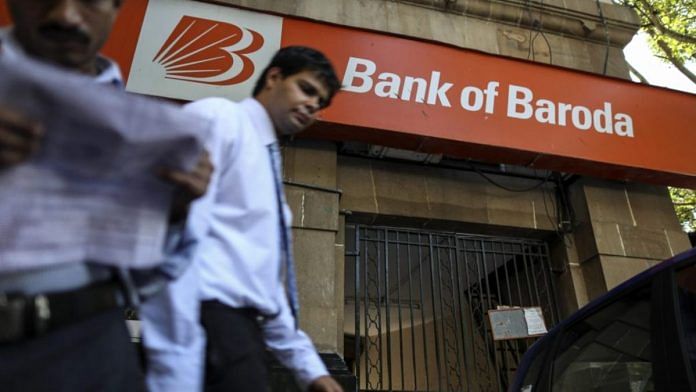New Delhi: Two days after Bank of Baroda reduced free cash withdrawals and deposits for its customers, the Ministry of Finance said in a statement Tuesday the bank has decided to withdraw these charges due to the “Covid-19 situation”.
Bank of Baroda reduced the number of free cash deposits and withdrawals allowed at its branches from five to three with effect from 1 November. For additional withdrawals and deposits, the charges varied from Rs 40 to Rs 150, depending on the location of the bank, the type of the account and the nature of the transaction.
Though the bank reduced the number of free transactions, it did not raise the charges, according to the revised charges uploaded on the bank’s website. Also, no service charge was levied on basic savings accounts and accounts like Jan Dhan.
The finance ministry statement said: “Bank of Baroda has since informed (us) that in the light of the current Covid-related situation, they have decided to withdraw the changes.”
“Further, no other PSB (public sector bank) has increased such charges recently,” the statement added.
Bank of Baroda announced the withdrawal of the charges on its website as well.
The finance ministry statement further said all banks are free to levy charges in a fair manner depending on the costs involved but added: “… Other PSBs have also intimated that they do not propose to raise bank charges in the near future in view of the Covid pandemic.”
Charges levied by public sector banks are, however, relatively lower compared to their private sector counterparts.
For instance, for cash withdrawals, deposits, requests for cheque books and for maintaining the average quarterly balance, the charges levied by the private banks are typically higher compared to public sector banks.
Also read: This is the only strategy that can bring success to Bank of Baroda
Lack of autonomy for state-run banks
Former bankers have earlier pointed out that such intervention by the government is contrary to the promise of operational autonomy promised by the Narendra Modi government after it came to power.
Former RBI governor Raghuram Rajan and former deputy governor Viral Acharya had flagged the lack of autonomy for state-run banks in a paper in September.
Terming the Modi government’s efforts to reform state-owned banks as a still-born effort, they had pointed out how despite decisions taken at ‘Gyan Sangam’ in 2015 to give autonomy to bank boards, little has changed in the last five years.
“The failure of the Gyan Sangam suggests that any change has to have steady political support (rather than a one-off ceremony) and will have to be forced on a bureaucracy, notably the Department of Financial Services in the Finance Ministry, that has little incentive to change,” they wrote.
“Yet it is probably unfair to blame just the bureaucracy — the government in power has little incentive to loosen its grip on public sector banks,” they added.
Also read: How Bank of Baroda beat India’s worst bond-market rout in two decades



